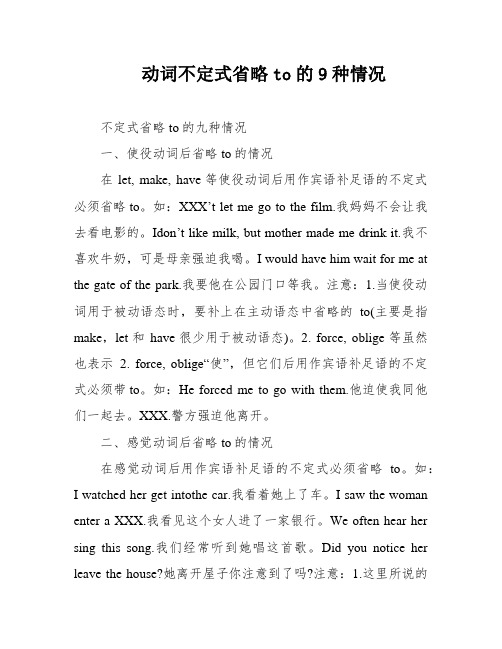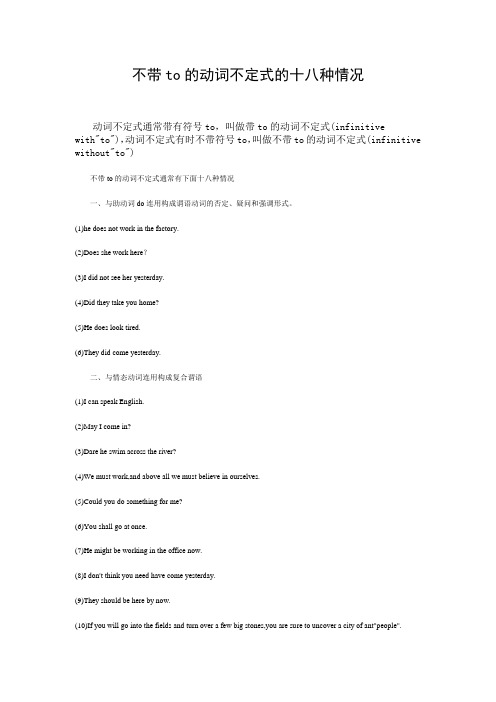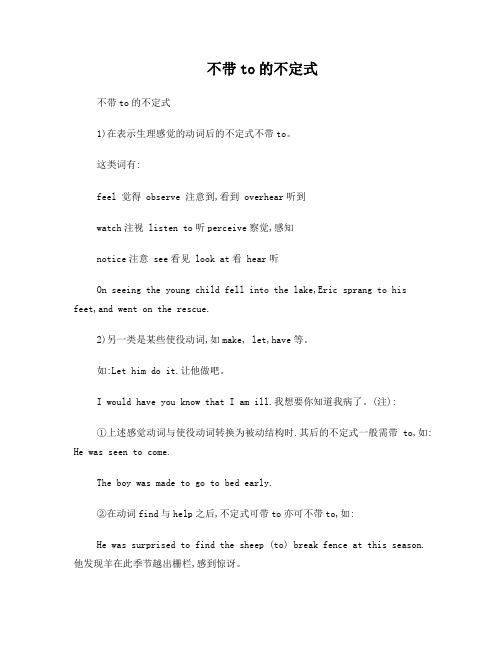不带to的动词不定式
动词不定式省略to的9种情况

动词不定式省略to的9种情况不定式省略to的九种情况一、使役动词后省略to的情况在let, make, have等使役动词后用作宾语补足语的不定式必须省略to。
如:XXX’t let me go to the film.我妈妈不会让我去看电影的。
Idon’t like milk, but mother made me drink it.我不喜欢牛奶,可是母亲强迫我喝。
I would have him wait for me at the gate of the park.我要他在公园门口等我。
注意:1.当使役动词用于被动语态时,要补上在主动语态中省略的to(主要是指make,let和have很少用于被动语态)。
2. force, oblige等虽然也表示 2. force, oblige“使”,但它们后用作宾语补足语的不定式必须带to。
如:He forced me to go with them.他迫使我同他们一起去。
XXX.警方强迫他离开。
二、感觉动词后省略to的情况在感觉动词后用作宾语补足语的不定式必须省略to。
如:I watched her get intothe car.我看着她上了车。
I saw the woman enter a XXX.我看见这个女人进了一家银行。
We often hear her sing this song.我们经常听到她唱这首歌。
Did you notice her leave the house?她离开屋子你注意到了吗?注意:1.这里所说的感觉动词主要包括see, hear, observe, notice, feel, watch等。
但是它们用于被动语态时,其后的不定式必须带to。
如:XXX woman was XXX enter a XXX.有人看见这个女人进了一家银行。
但是,用于以上句型的动词notice和watch和通常不用于被动语态。
2.类似地,动词look at和listen to后用作宾语补足语的不定式也不带to。
动词不定式省略to的9种情况

不定式省略 to 的九种情况一、使役动词后省略to 的情况在 let, make, have等使役动词后用作宾语补足语的不定式必须省略to 。
如:My mother wouldn’ t let me go to the film.我妈妈不会让我去看电影的。
I don ’t like milk, but mother made me drink it.我不喜欢牛奶,可是母亲强迫我喝。
I would have him wait for me at the gate of the park.我要他在公园门口等我。
注意: 1. 当使役动词用于被动语态时,要补上在主动语态中省略的 to( 主要是指 make ,let 和 have 很少用于被动语态 )。
2. force, oblige等虽然也表示 2. force, oblige “使”,但它们后用作宾语补足语的不定式必须带to 。
如: He forced me to go with them.他迫使我同他们一起去。
The police obliged him to leave.警方强迫他离开。
二、感觉动词后省略to 的情况在感觉动词后用作宾语补足语的不定式必须省略to 。
如:I watched her get into the car.我看着她上了车。
I saw the woman enter a bank.我看见这个女人进了一家银行。
We often hear her sing this song.我们经常听到她唱这首歌。
Did you notice her leave the house?她离开屋子你注意到了吗?注意:1. 这里所说的感觉动词主要包括see, hear, observe, notice, feel, watch等。
但是它们用于被动语态时,其后的不定式必须带to 。
如:The woman was seento enter a bank.有人看见这个女人进了一家银行。
不带to的动词不定式的十八种情况

不带to的动词不定式的十八种情况动词不定式通常带有符号to,叫做带to的动词不定式(infinitive with"to"),动词不定式有时不带符号to,叫做不带to的动词不定式(infinitive without"to")不带to的动词不定式通常有下面十八种情况一、与助动词do连用构成谓语动词的否定、疑问和强调形式。
(1)he does not work in the factory.(2)Does she work here?(3)I did not see her yesterday.(4)Did they take you home?(5)He does look tired.(6)They did come yesterday.二、与情态动词连用构成复合谓语(1)I can speak English.(2)May I come in?(3)Dare he swim across the river?(4)We must work,and above all we must believe in ourselves.(5)Could you do something for me?(6)You shall go at once.(7)He might be working in the office now.(8)I don't think you need have come yesterday.(9)They should be here by now.(10)If you will go into the fields and turn over a few big stones,you are sure to uncover a city of ant"people".但与情态动词ought(to)连用时通常带to,和used(to)连用时必须带to三、在表示感觉的动词如:see,look.at,watch,hear,listen to,feel,notice,observe,perceive(觉察,看见),behold(书面用语“见到”)等后用作宾语补足语的动词不定。
不带to的不定式

不带to的不定式不带to的不定式1)在表示生理感觉的动词后的不定式不带to。
这类词有:feel 觉得 observe 注意到,看到 overhear听到watch注视 listen to听perceive察觉,感知notice注意 see看见 look at看 hear听On seeing the young child fell into the lake,Eric sprang to his feet,and went on the rescue.2)另一类是某些使役动词,如make, let,have等。
如:Let him do it.让他做吧。
I would have you know that I am ill.我想要你知道我病了。
(注):①上述感觉动词与使役动词转换为被动结构时.其后的不定式一般需带to,如: He was seen to come.The boy was made to go to bed early.②在动词find与help之后,不定式可带to亦可不带to,如:He was surprised to find the sheep (to) break fence at this season.他发现羊在此季节越出栅栏,感到惊讶。
3)在do nothing/anything/everything but(except)结构中。
例如:Last night I did nothing but watch TV.昨天晚上,我除了看电视别的什么也没有干。
但是,如果谓语动词不是“do nothing,anything,everything”,那么but(except)所跟的不定式则仍须带。
The doctor told him nothing but to stop smoking.医生除了让他戒烟,其它什么都没有说。
There was nothing for them to do but to remain silent.除了保持沉默以外,他们没有别有别的办法。
不带to的动词不定式通常有下面十八种情况

(1)We found the farm crops(to) do well.
(2)I find the Chinese people to be happy and cheerful.
(8)I had sooner live on a farm than in the city.
(9)He would sooner resign than take part in such dishonest business deeds.
(8)He observed someone open the door.
(9)I did not perceive anyone come in.
(10)He beheld her go out.
(5)Could you do something for me?
(6)You shall go at once.
(7)He might be working in the office now.
(4)I heard her play the piano.
(5)He listend to us talk.
(6)I felt the floor move.
(7)I didn’t notice you enter.
不带to的动词不定式通常有下面十八种情况.txt今天心情不好。我只有四句话想说。包括这句和前面的两句。我的话说完了对付凶恶的人,就要比他更凶恶;对付卑鄙的人,就要比他更卑鄙没有情人味,哪来人情味 拿什么整死你,我的爱人。收银员说:没零钱了,找你两个塑料袋吧! 不带to的动词不定式通常有下面十八种情况
动词不定式省略to的9种情况

不定式省略to的九种情况一、使役动词后省略to的情况在let, make, have等使役动词后用作宾语补足语的不定式必须省略to。
如:My mother wouldn’t let me go to the film. 我妈妈不会让我去看电影的。
I don’t like milk, but mother made me drink it. 我不喜欢牛奶,可是母亲强迫我喝。
I would have him wait for me at the gate of the park. 我要他在公园门口等我。
注意:1. 当使役动词用于被动语态时,要补上在主动语态中省略的to(主要是指make,let和have很少用于被动语态)。
2. force, oblige等虽然也表示2. force, oblige“使”,但它们后用作宾语补足语的不定式必须带to。
如:He forced me to go with them. 他迫使我同他们一起去。
The police obliged him to leave. 警方强迫他离开。
二、感觉动词后省略to的情况在感觉动词后用作宾语补足语的不定式必须省略to。
如:I watched her get into the car. 我看着她上了车。
I saw the woman enter a bank. 我看见这个女人进了一家银行。
We often hear her sing this song. 我们经常听到她唱这首歌。
Did you notice her leave the house? 她离开屋子你注意到了吗?注意:1. 这里所说的感觉动词主要包括see, hear, observe, notice, feel, watch等。
但是它们用于被动语态时,其后的不定式必须带to。
如:The woman was seen to enter a bank. 有人看见这个女人进了一家银行。
不定式的六种形式及例句
不定式的六种形式及例句一、不定式的六种形式1. 带to的不定式:例句:He can’t wait to go to Canada. 他迫不及待想去加拿大。
2. 不带to的不定式:例句:We watched the star rise in the sky. 我们看到星星升起在天空。
3. 带-ing形式的不定式:例句:She enjoys swimming in the ocean. 她喜欢在大海里游泳。
4. 带-ed形式的不定式:例句:The little girl was frightened of seeing a ghost. 小女孩吓得不敢看鬼。
5. 带bare infinitive形式的不定式:例句:I must make him pay for his mistake. 我必须让他为他的错误付出代价。
6. 带for形式的不定式:例句:He made me wait for an hour. 他让我等了一个小时。
二、不定式的六种形式1. 带to的不定式:不定式带to是最基本的不定式形式,它包含未来及过去的时态,意思是“要做某事”。
例如:I need to call my parents. 我要给父母打电话。
2. 不带to的不定式:不带to的不定式不含有表示将来意义的to,只有主要动词,意思是“看到,听到”某事的发生。
例如:I heard the wind blow. 我听到风吹。
3. 带-ing形式的不定式:带-ing形式的不定式表示对象做动作的原因,是以动作为中心的一种不定式形式,意思是“为了做某事”。
例如:He left school early, worrying his mother. 他早早离开学校,令他妈妈担心。
4. 带-ed形式的不定式:被动语态的-ed形式不定式表示被动状态,意思是“被做某事”。
例如:He was offered an interesting job. 他得到一份有趣的工作机会。
英语中不带 to 的不定式
不定式有带to 和不带to 两种,以下例举不带to 的不定式。
一、助动词shall, should, will, would, may, might, do, did, can, could, must, need, dare 后接不带to 的不定式,例如:shall:I shall invite them.我将邀请他们。
should:You shouldn't drink and drive.你不该酒后驾车。
will:How long will you be staying in Paris?你将在巴黎待多久?would:We said we would keep them.我们说过要保存它们的。
may:That may or may not be true.这可能是真的,也可能不是。
might:He said he might come tomorrow.他说他明天可能来。
do:I don't like fish.我不喜欢鱼。
Don’t be late!别迟到!did:They didn't go to Paris.他们没去巴黎。
He didn’t eat meat.他不吃肉。
can:He can speak English.他会说英语。
could:She said that she couldn't come.她说她来不了啦。
must:We must go now.我们现在必须走了。
need:You need not go.你不必去。
dare:He dare not refuse.他不敢拒绝。
二、当need 和dare 用作实义动词时,后面接带to 的不定式,例如:need:I need to get some sleep.我需要睡会儿觉。
dare:Did he dare to do that?他敢那样做吗?三、感官动词 see, hear 等的直接宾语后面可以接不带to 的不定式作宾语补语,表示动作已经做过或是完成了,例如:see:I saw her go.我看见她走了。
九类不带to的动词不定式
九类不带to的动词不定式(一)作使役动词let, have, make的宾语补足语的动词不定式不带to。
例如:She let her child play in the park. 她让她的孩子在公园里玩耍。
I had him arrange for a car. 我叫他给我安排了一辆车。
She made her children wash their hands before eating. 她要她的孩子们在吃东西前洗手。
注意:当使役动词make用于被动语态时,则该动词必须加上to。
例如:He was made to leave school by his father's death. 由于他爸爸的死,他被迫离开了学校。
(二)作感官动词see, watch, hear, feel, notice, observe等的宾语补足语的动词不定式不带to。
例如:I saw him cross the street. 我看见他横穿马路。
I felt the ship roll. 我们感觉船在摇晃。
注意:当此类动词用于被动语态时(watch一般不用于被动语态),则充当主语补足语的动词不定式要带动词不定式符号to。
例如:He was seen to enter the office. 有人看见他进了办公室。
(三)why (not) + 不带to的动词不定式。
例如:Why not come and see me tomorrow? 明天来找我怎么样?(四)had better + 不带to的动词不定式。
例如:You'd better go now. 你最好现在走。
(五)rather than位于句首时,其后用不带to的不定式,但rather than 在句中时,其后的动词不定式可以带to,也可以不带toRather than ride on a crowded bus,he always prefers to ride a bicycle. He prefers to rent a car rather than(to) have one of his own.(六)在find后作宾语补定语的动词不定式有时可以省to,但如动词为be,那么一般不省to,要省一起省略"to be"We found the farm crops(to) do well.I find the Chinese people to be happy and cheerful.I found this to be true in all the cities.(七)在but(=except),besides,than后的动词不定式一般要带to,但如果其前有作谓语的实义动词do,则不定式不带toThe soldier has no choice but to obey.He did not have any choice but to obey.She did nothing but clean the dishes.(八)两个或两个以上的动词不定式并列在一起时,第一个不定式带to,后面的不定式一般省去toHer job is to take care of the children and wash clothes.(九)在动词help后作宾语补足语的动词不定式可以带to,也可以不带,在英国英语中,多用不带to的不定式,但在英国英语中,help+宾语+不定式结构中,用不带to的不定式表示主语直接参与不定式的表示的动作,用带to的不定式表示主语没有直接参与不定式的表示的动作。
246 不带to的不定式
246 不带to的不定式A can,do,may,must,shall,will之后接不带to的不定式:They could do it today.他们可以今天做这件事。
I may as well start at once.我还不如马上就动身。
He will probably object.他可能会反对。
B need和dare之后也接不带to的不定式,但它们不作为情态动词而是同助动词do/did或will/would连用时除外:You needn’t say anything.你不必说什么。
但是说:You don’t/won’t need to say anything.你不需要/将不需要说什么。
I dared not wake him.我不敢叫醒他。
但是说:I didn’ t/wouldn’ t dare(to) wake him.我没敢/不敢叫醒他。
理论上,在最后一个例句中要求用to,但实际上常被省略。
按语法规则来说,如果dare和used用为助动词,它们就像大多数助动词一样后面接不带to的不定式;如果它们用为普通动词并与do/ did等连用,就像普通动词一样后面接带to的不定式。
C feel, hear, see和 watch:I heard him lock the door.我听见他锁了门。
I saw/watched him drive off.我看见他开车走了。
但see和hear在被动语态的句子中要与带to的不定式连用:He was seen to enter the office.有人看见他进了办公室。
He was heard to say that…有人听见他说过……但feel,hear,see和watch经常是与现在分词连用:I heard them shouting.我听到他们在大声喊叫。
(参见第273节。
)D let在主动语态和被动语态的句子中都与不带to的不定式连用。
- 1、下载文档前请自行甄别文档内容的完整性,平台不提供额外的编辑、内容补充、找答案等附加服务。
- 2、"仅部分预览"的文档,不可在线预览部分如存在完整性等问题,可反馈申请退款(可完整预览的文档不适用该条件!)。
- 3、如文档侵犯您的权益,请联系客服反馈,我们会尽快为您处理(人工客服工作时间:9:00-18:30)。
不带to的动词不定式有哪些
?
不定式是英语动词的非限定形式之一,是英语中一种非常活跃的语言现象,不带to的不定式(bare infinitive)是我们学习、掌握和运用这一语法现象的难点。
本文的目的就是要对不带to的不定式作一粗浅的探讨。
首先要指出的是,不带to的不定式的使用实际上非常普遍,主要用在情态动词和助动词will,shall,would,should,can,could,may,might,must…以及在作为情态动词的need和dare之后。
但因为这一点在学习英语的过程中极易掌握,故不在此赘述。
除此以外,在下列情况下也要使用不带to的动词不定式。
1.在see,feel,hear,watch,observe,listen to,look at, notice等感官动词或短语以及let,have,make等表示祈使意义的动词后面;不定式作宾语补足语不能带to;help后面的不定式可以不带to,也可以保留to;know在一定的条件下,后面的不定式作宾语补足语时可以不带to。
例如:
I saw the man come out of the house.
I heard her say that she was from Japan.
We felt the house shake.
They watched the sun sink into the sea.
Did you notice him stop
They did not observe Jim come in and go upstairs.
She was listening to him climb the stairs.
Look at the boy run!
I'll let you know as soon as I hear from her.
I had him mend my watch.
Electricity makes motors run.
He helped me(to)plant trees.
I have never known him sing so beautifully.
不带to的动词不定式跟在上述动词后面时,情况比较复杂,有以下几个问题须特别注意:
(1)当上述句子变成被动语态时,原来作宾语补足语的不定式则相应地成为主语补足语。
这时,不定式就一定要带to,以上述句子为例:
The man was seen to come out of the house.
She was heard to say that she was fed up.
(后面的句子以此类推)其原因是“英语中还有一条规律:凡是被动的动词都不能和不带to 的不定式连用。
其中只有let除外,原因是作主语补足语的不定式是单音节词。
例如:
The students were let go after class.
The grass was let grow.
(2)不定式在help之后,既可以用作宾语补足语,也可直接作宾语,例如:
This book will help(to)improve your English.
help之后不定式带to还是不带to可能有以下几种区别:①不带to结构在非正式文体中更为常见。
②用不带to的不定式在美国英语中似乎比在英国英语中更常见。
③决定不定式带不带to主要牵涉到主语,如果主语不能参与到不定式的动作中去,则不定式通常都要带to。
例如:
This book helps to see the truth.
This book will help you to use English.
(3)have known后面跟的不定式可以不带to,也可以保留to。
例如:
I have known her(to)lie.
never knew和have never known的后面通常跟不带to的不定式,但偶尔也可以见到带to的不定式。
例如:
I never knew him do anything without a good reason.
I have never known him say this before.
I have never known her to tell lies.
(4)如果在feel,know,observe,see后面跟的不定式是be,则to不可省略。
例如:
We all felt that to be the highest praise.
We know him to be brave.
The only thing that I have observed to be without limit is the businessman's desire for profits.Now I saw him to be the man who walked up the hill every morning.
应该注意到的是feel和see这两个动词在上述例句中已不是感觉动词,它们的意思分别是“认为”、“以为”和“知悉”、“了解”。
2.在口语里,用在祈使句中或者不定式go或come后面的不定式有时可以省略to。
例如:Go ask her.
Why not call John and ask him to come have dinner with us
3.有时在besides的后面也可以跟不带to的不定式。
例如:
That afternoon I had nothing to do besides answer letters.
4.Why在疑问词中是唯一能不用助动词便可引导疑问句的。
其结构为why+不带to的不定式或why not+不带to的不定式。
两种结构虽然都是疑问句的形式,但却分别表示不同的意思。
前者通常用来表明做某事是愚蠢的或无意义的,意为“干嘛要……”。
后者实际是用来提出建议或劝告,意为“何不……”或“干嘛不……”。
例如:
Why stand up if you can sit down
Why not go there with them
5.had better,had best,would rather,would sooner,would as soon后面跟不带to的不定式。
例如:
You'd better get some sleep.
You had best get home before midnight.
I would rather not go out tonight,if you don't mind.
I'd sooner stay at home.
I would as soon do it by myself.。
